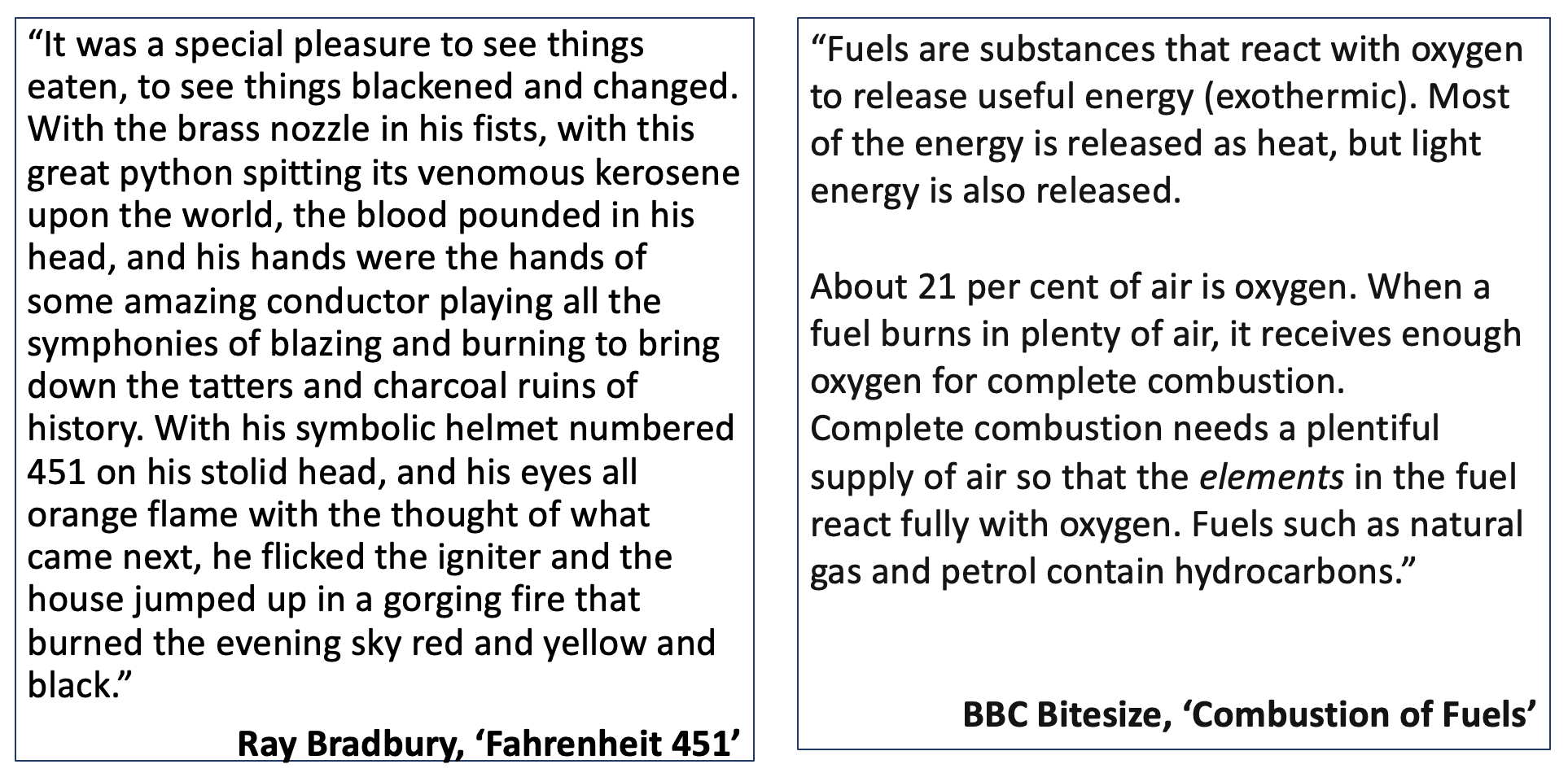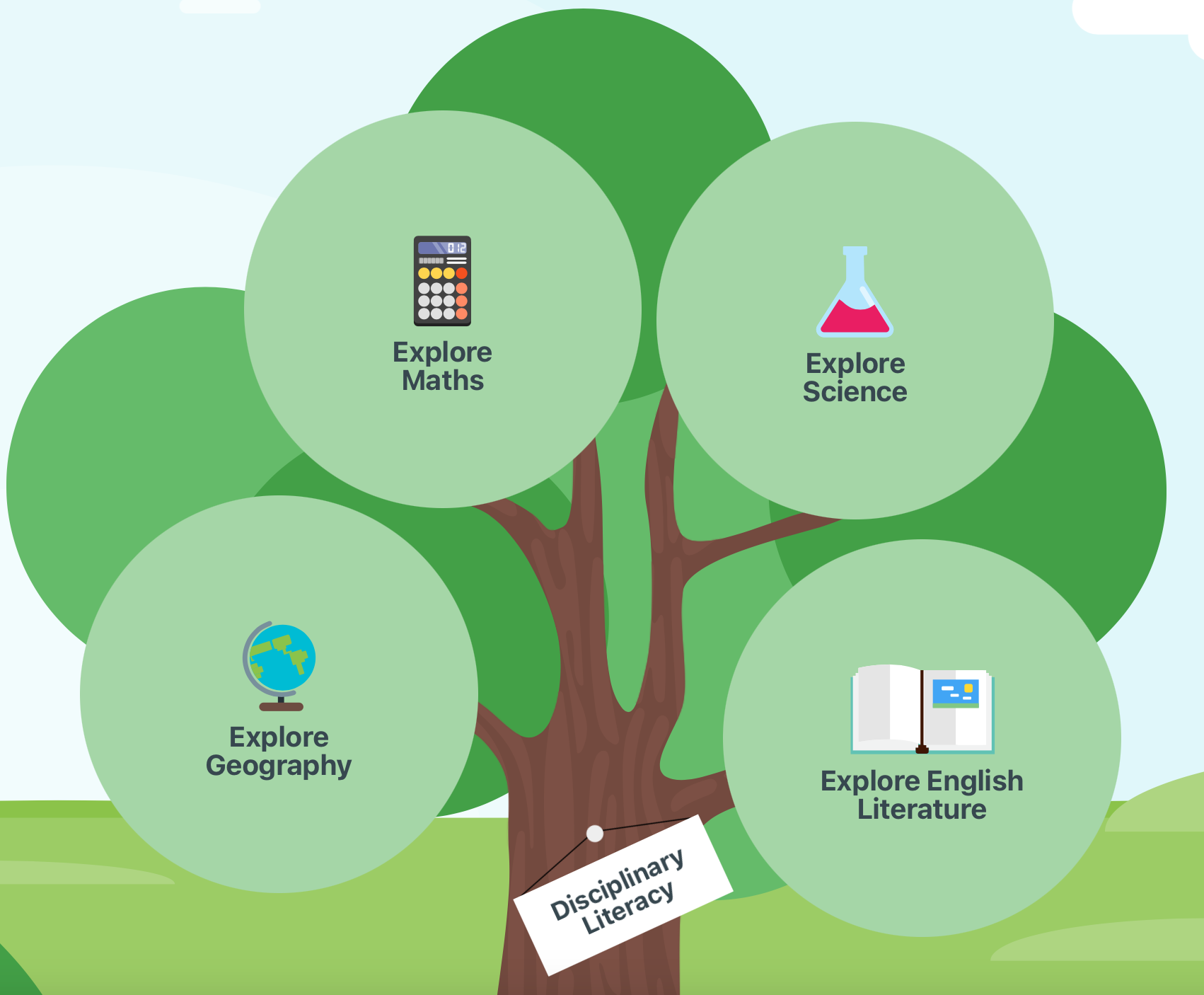How pupils read, write, talk, and the vocabulary they use in every classroom is specialist and unique. There are general words and literacy strategies to deploy, but as pupils move up through school, the language they use gets more specialist and subject specific. As a result, the language of the subject discipline matters.
'Disciplinary literacy' matters.
Take a moment to quickly read the two following texts:

What do you notice?
Both texts are ostensibly describe fire, but their language mediates that concept in very different ways. The fiction text by Ray Bradbury is a tour de force description full of imagery and action verbs. By contrast to the literary text, the BBC Bitesize extract deploys the more abstract language of science. You notice the different vocabulary choices, sentence lengths, grammar choices, and much more.
For a skilled reader, we can read both texts so automatically that we do not quite notice the different language, the background knowledge we activate as we read, or the different reading moves undertaken. In concrete terms, disciplinary literacy is the act of explicitly paying attention to those subtle but vital differences. For a chemistry teacher, it is important to teach the language of science with explicitness because it is so unique and often far away from the everyday language pupils use.
Disciplinary literacy is nothing new. In 1975 - nearly 50 years ago - The Bullock Report stated "a policy for language across the curriculum should be adopted by every secondary school." Arguably, disciplinary literacy has struggled to take hold ever since. Too often perhaps, we have assumed a literacy coordinator, or a reading lead, had too much responsibility, but too little knowledge of the different subject disciplines to actually support a range of teachers across the school.
Disciplinary literacy might matter, but it clearly proves difficult to implement successfully.
Doing literacy differently
"As students progress through an increasingly specialised secondary school curriculum, there is a growing need to ensure that students are trained to access the academic language and conventions of different subjects. Strategies grounded in disciplinary literacy aim to meet this need, building on the premise that each subject has its own unique language, ways of knowing, doing, and communicating"
EEF, Improving Literacy in Secondary Schools
Implementing disciplinary literacy effectively is a collaborative effort. Given the importance of subject expertise in deciphering how to read, write or talk in a given subject domain, any literacy coordinator or school leader, is unlikely to have all the answers. Done well, and done collaboratively, disciplinary literacy can offer pupils a set of tools to crack open the curriculum.
For those seeking to lead disciplinary literacy, it makes sense to solve the problems pupils face when they are grappling with difficult reading or writing tasks. We can ask teachers to share maths word problems, or exam questions, that have proven uniquely tricky. Then we can scrutinise what exactly is it that makes the reading specifically challenging. For example, in maths, we can identify some of the problems that attend reading must-step word problems, such as:
Pupils can find it difficult to move between text and graphics.
Pupils can find maths vocabulary difficult given some words have highly specific meanings only found in maths (e.g. isosceles), whereas other words have very wide common use but a different meaning in maths (e.g. prime, factor). Alongside this, some maths terms sound like familiar words, but are not (pi – not pie!).
Pupils have to interpret words to find the appropriate mathematical symbol, so ‘increase’, ‘positive, ‘add’ and ‘more’ can denote ‘+’.
Pupils can easily confuse related mathematical terms, e.g. denominator and numerator.
(from 'Closing the Reading Gap')
For busy maths teachers, we can identify disciplinary reading challenges and go about collaborating with 'reading in maths' (see my blog on 'Does reading really matter in maths?'). Thus, disciplinary literacy becomes concrete - solving real problems for busy teachers.
What I have observed in the last year or so are lots of blogs by teachers who are doing disciplinary literacy and explaining how they have done it. Take a look at the following:
- 'How to develop disciplinary literacy in maths', by Elizabeth Bridgett.
- 'Exploring disciplinary literacy in science', by George Duoblys.
- 'What is disciplinary literacy and how can we embed it?' by Johnny Richards.
- 'Exploring disciplinary literacy in maths', by Amarbeer Singh Gill.
- 'Disciplinary literacy: Reading in subject disciplines', by Mark Miller.
- 'Using dialogue to secure scientific understanding', by Kate Walter.
- 'How I teach extended writing in science', by Dr. Jo Castelino.
- 'Improving primary science: Developing pupils' scientific vocabulary', by Jody Chan.
My literacy content and engagement specialist at the EEF, Chloe Butlin, has also developed a handy tool to begin discussing and implementing disciplinary literacy. 'The Disciplinary Literacy Tree' is an interactive resource, which also includes a useful discussion prompt for secondary school colleagues, for those wanting to start talking and doing disciplinary literacy.







Comments